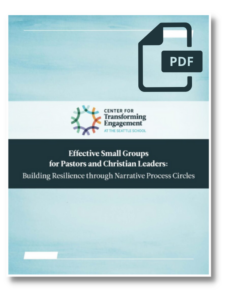As a leader, you need to reflect on your own story to create healthier relationships with yourself, God, and the people you serve. We’ve assembled over 30 of our favorite articles, podcasts, and books that can give you further insight into exploring your own story and how it informs the ways in which you interact with the world. Browse them below, or download this list as a PDF here.
Read: Articles
The 3 Central Questions of the Story Workshop by Dan Allender
A Theology of Stories by Kate Rae Davis
Room (2015), Transitions, Gratitude, and Forgiveness by Kate Rae Davis
Ambiguous Loss & The Liturgies of Lament by Brittany Deininger
Retelling Hagar’s Story: Reading Trauma in Genesis 16 by Marina Hofman
The Importance of Inner Work by Blaine Hogan
Lay Your Tired Stories to Rest by Charlie Howell
Accepting Your Darkest Emotions is the Key to Psychological Health by Lila MacLellan
Living the Questions: Knowing Your Story by Matt Morrissey
How Christian theology and practice are being shaped by trauma studies by Shelly Rambo
The Trauma of God by Frank Seeburger
Chronic Stress as Trauma: Resilience in the Time of COVID-19 by Andrea Sielaff
Disillusionment, Posttraumatic Growth, and Resilience in Pandemic by Andrea Sielaff
Why Trauma & Theology? by Chelle Stearns
God’s Child: A New Imagination in Trauma Healing by Margaret Trim
9 Theology and Trauma Books to Read from The Seattle School
Circles of Support – a free downloadable resource
Read: Books
To Be Told: Know Your Story, Shape Your Life by Dan Allender
Know Your Story and Lead with It: The Power of Narrative in Clergy Leadership by Richard L. Hester, Kelli Walker-Jones
Leading with a Limp: Turning Your Struggles into Strengths by Dan Allender
Finding Our Story: Narrative Leadership and Congregational Change by Larry A. Golemon
Trauma and Grace: Theology in a Ruptured World by Serene Jones
Spirit and Trauma: A Theology of Remaining by Shelly Rambo
Listen: From the Allender Center Podcast
Why Should I Look at My Story?
The Role of the Past in Current Relationships
Watch
Pain & Art: Write What You Honestly Know by Ryan Gattis
What Trauma Taught Me About Resilience by Charles Hunt
Where is the Wounding? by Dr. Stephanie Neil

To learn more about how to reflect on your own stories to create healthier relationships with yourself, God, and the people you serve, download our free PDF: Effective Small Groups for Pastors and Christian Leaders.
We break down how we structured our narrative process cohorts, now called Circles, back in 2017 – and the eye-opening ways in which they supported clergy resilience.
